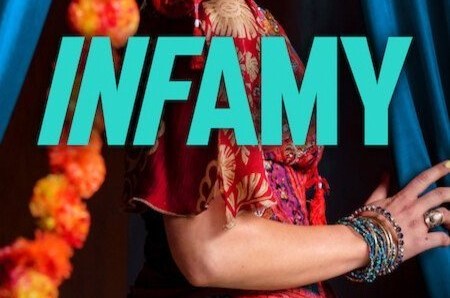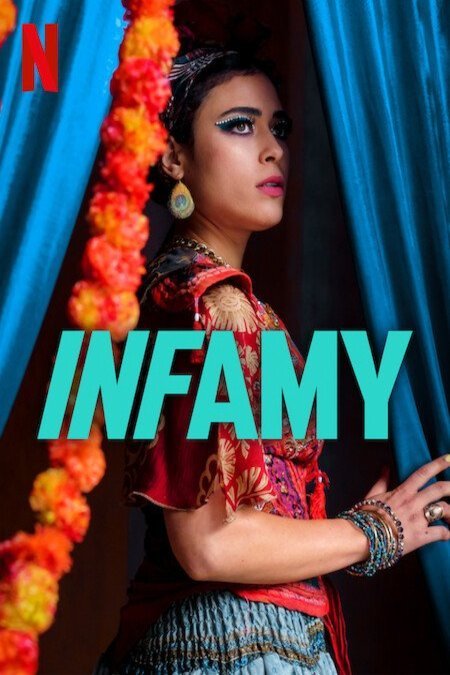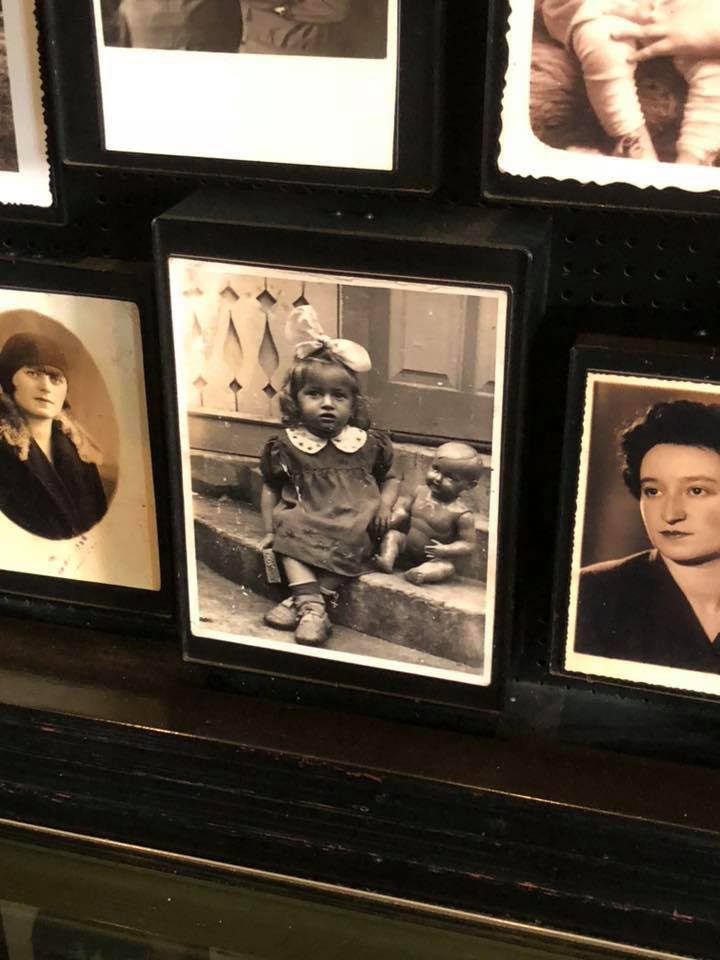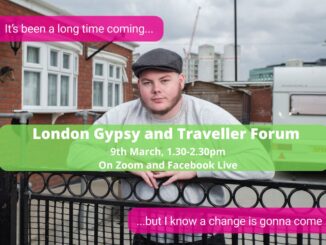
”Infamia (Infamy)” är en serie om en 17-årig Romsk tjej på åtta avsnitt av Anna Maliszewska och Jakub Czekaj. Det är i många avseenden en unik och mycket originell produktion. I berättelsen bjuder skaparna in oss till polska Romers värld, en värld flertalet inte vet så mycket om den. Serien handlar om en Romsk tjej som balanserar mellan strikta föräldraregler och grupptryck och drömmer om en hiphopkarriär.
| Text: Maria Dumitru Ruiz |
“You are Roma until you die““
Opinion on Infamia
By Maria Dumitru Ruiz
Apart from being a series that talks about the struggles of a Roma youngster woman to become a rap singer and follow her dreams, this series brings into its scene’s real experiences of hate and racism that Roma women and men encounter in Poland and in other countries in Europe. For those who still do not know, the Roma community is the largest ethnic minority in Europe and the most discriminated one.
While this series on Netflix has sparked strong impressions about freedom, patriarchy, music and racism, such TV shows carry a responsibility when showing a racialised community, which was subject historically to injustices, such as enslavement, Holocaust, sterilisation, survived centuries of anti-Roma laws and marginalisation.
Even though it brings into discussions the experience of racism, its formation and narrative, it is still based on stereotypical and prejudicial depictions. Starting from the fact that Roma are travellers. Most of Roma groups are settled. If the series wanted to sketch a social critique, they would not join and portray all the stereotypes in 8 episodes: The illegal business with drugs or other irregular activities, like dog fights, arranged marriage, and bride selling, the so-called Roma law. Some of the things are unknown or not practiced by the 12 million Roma individuals who are part of a diverse and heterogeneous community all around Europe.
Even though this is fiction, it is very much inspired by the lived experiences of Roma, not just in Poland but in Europe as well. Pogroms, for instance, and killings of Roma as shown in the TV series, are not isolated cases or non-recurrent incidents. It re-enacts earlier riots which happened in Poland, and we recall the Mława riot, which was a series of violent devastations in 1991 when a group of youth of 200 individuals invaded and broke into the homes of Roma residents of the Polish town of Mława, causing them to flee. For the readers, a pogrom is an organised massacre of a particular ethnic group, and agaist the Roma, it happened in many Eastern and Western countries. Some of the most known were in Romania at the end of 90’ ending with four Roma murders. At the beginning of 2000,’ others happened in Hungary where attacks from Neo-nazi killed 6 Roma persons. Other pogroms happened in Italy in 2008, in Ukraine in 2020, and some recent ones in Spain in Jaén 2022.
While big houses, gangsters, familiar dramas, drug ”business” patriarchy, bride selling, or other Gadje inventions are hot topics, it is impossible not to raise questions about how this kind of TV series informs/reinforces public opinions, and thus awakening new prejudices coming from the same old stereotypes. Here comes into the discussion antigypsyism, a hatred against Roma which has historically been present among all European countries, being translated in centuries of oppression and exclusion, and still marking the existence of the Roma communities along Europe.
This is not to say that this TV movie did not have aspects that can be positively highlighted. First, we are watching a fierce Roma character defying the intersectional discrimination that Romani women encounter. Her drive charms everyone with solid lines, many of them feminists; however, the narrative tends to essentialise the Roma communities. Lines like: “It is true that the g*psies learn to be patriarchal since they are born.” or “The Roma have their laws.” That is false; Patriarchy is a fenomenon embedded in all societies and was not invented by the Roma men. However, due to the exclusion and lack of access to education and support, patriarchy can be present among these communities like in any others. Furthermore, for many Roma, this ‘law’, which is an informal justice system, is another consequence of institutional racism; it is not practiced by the majority communities. Whenever it is in practice, it is functioning due to exclusion and lack of access to justice. To continue with, other essentialist elements revolve around the relationship with the music; the inherited happy spirit like inherent to any Roma because it ’is in the blood.’ Such depictions have also appeared in other movies, such as Carmen y Lola or the famous Netflix series Peaky Blinders.
Some lines are actually documented: “The Roma are the most discriminated group in Europe,” and in that moment, the TV series looks like a critique of a racist system. Still, the overall negative portrayal of the characters, in style, jobs, house design, family types, way of talking, and clothing, dominated the narrative and is precisely what Gadje would have in their mind.
Furthermore, although the young character defies this given narrative (challenging internal struggles of marginality, patriarchy, control, and access to education), the solution to freedom is to be found only outside of the community. Because the Roma community, as it is portrayed at the beginning, is inherently patriarchal, probably homophobe and overall, backwards. It is exactly a reflection of what we (the society) think about ‘G*psies.’
All in all, has this TV movie racist depictions? Yes!
All the scenes are bad? No!
Why?
- There is a willingness to open discussions around the globe about marginality, racism, and patriarchy, especially for those communities which still struggle for recognition.
- Using Romanes, the Romani language – a language that was forbidden in almost all European countries and now having it translated into over 100 languages, is to be mentioned as something positive.
- The fear of saying you are Roma due to hostility was also an impactful thing because it shifts the problem to the context, not on the Roma people or youngsters. Roma would say they are Roma if are in a safe and respectful environment.
- The strong characters like Gita, her mom and the grandmother are to be praised. Especially the empowering lines of the wise grandmother: ”We chose those Roma who are smart, not those who wear pants.” Thus, challenging both power and patriarchal rules. Or “we are strong, and we will not let anyone hurt you.” Such lines show the solidarity and the strong bond that these women can create to support younger Roma women.
- The usage of the Roma flag, International Roma Day (8 April) and other symbols such as Nane Toha, an important Roma song, are educational and a step ahead in making visible the Roma communities.
- Solidarity from the Gadje. It is essential to give hope to those Romani people watching this series that are not alone and that the non-Roma fight against anti-Roma racism as well. Because while this movie was fiction, the experiences of hatred shown can reflect the everyday lived experiences of Roma.
- Finally, representation (although very stereotypical), Roma youngsters need representation. We all need people from media&television, and arts to identify with. We need characters like Gita, or characters played by Roma actresses like Alina Serban or Mihaela Dragan to be mainstream. We need more bands like the Pretty Loud, or artists like Malgorzata Mirga-Tas. When we offer the space to such voices, we speak back to millions of Roma who are part of this European society but do not find their favourite Roma artists, characters, sherous because they are invisibilised.
In the end, many things must be improved and challenged when we show a community that has been subject of historical oppression in Europe. But there are also some positive lessons learned from this series and one of them is: There is not a way of being a Roma girl or a Roma woman; there is not a standard. It does not matter your style, your music, if you lived in a shanty or in a privileged neighbourhood, if you have white parents, if you marry non-Roma, if you are LGTBQI+ or if you are a light or dark skin Roma.
If you are born Roma: ”You are Roma untill you die.”

redaktionen@dikko.nu
Att vara en oberoende tidning kostar pengar så vill du hjälpa oss med att betala vårt fika får du gärna swisha en slant till 123 242 83 40 eller bg: 5534-0046
Vill du annonsera eller sponsra, synas eller höras i våra media?
Kontakta oss på redaktionen@dikko.nu
eller ring 0768 44 51 61
IBAN: SE19 9500 0099 6042 1813 4395
BIC: NDEASESS




